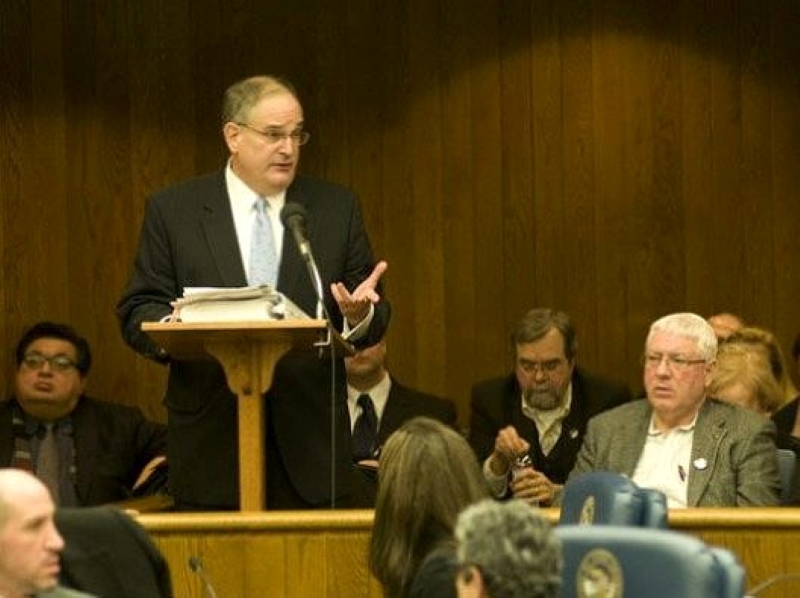Eugene Sunshine retired from his position as Senior Vice President for Business and Finance at Northwestern University in 2014. With almost 30 years’ experience in higher education finance and administration, Sunshine has helped to guide institutions through good times and bad, including the financial crisis of 2007-08 and the ensuing Great Recession. We asked him to discuss the importance of financial leadership at colleges and universities during times of crisis.
Q: When institutions confront a crisis of this magnitude, how do they begin planning?
A: The response is going to differ based on such factors as whether you’re smaller or larger, or public or private. And it will be very challenging to estimate financial exposure: This will depend on how long the pandemic lasts, what the Federal Reserve does, what other institutions do, what the markets do, etc. There are some very large variables on both the expenditures and revenue side, and it is important to think about what those variables are. On the revenue side, for example, you have things like undergraduate tuition, federal grants, and fundraising. On the expenditures side, you have education costs, financial aid, and debt service.
Once you have your key variables identified, you need to put parameters around each. What are the scenarios for best case, middle of the road, and worst case? There are important questions to ask for each variable. For example, on the revenue side:
- Net tuition: Will we lose students? What will the new class look like, and what will be their financial aid needs?
- Fundraising: To what extent can you increase annual giving, which will help with cash needs today? How hard will an economic downturn hit fundraising efforts?
- Federal grants: These cost money as well because of matching requirements, but they’re important. What programs might be threatened, and what percentage of grant funding do they represent?
You want to argue about these questions as you start putting numbers around the variables. It makes people think about all the consequences. And then you do the same thing on the expenditures side. Where are we going to have to spend money (for example, financial aid, housing cost breaks, bolstering our online programs)? When you get to ranges and amounts you agree on, add them up for each of the three scenarios.
Q: Who needs to be involved in these conversations?
A: You’ll want to pick people for the planning team who have solid expertise and are well-regarded and open-minded. If you have a good vice president of facilities, for example, he or she needs to be at the table, regardless of reporting relationships. Similarly, if you have a big athletics program, someone like the associate athletic director for finance should be on the team. You’ll also want representatives from the major schools or departments—senior associate deans for finance and administration, for example—whom the deans are also comfortable with.
Even though they might not be on the planning team, you will want to keep the president, provost, and deans informed and up to date on the planning team’s conversations and findings. And it is important that these be two-way conversations—talk to them and listen to them. Give them a chance to ask questions. You want to secure as much buy-in as possible, and make sure they are aware of the numbers as they’re making decisions. Surround leadership with the facts. If you haven’t done this, you can’t complain if the leadership don’t make good decisions. Lots of college and university CFOs are used to being in the background. That doesn’t work in these situations.
Q: What should be the relationship of financial leaders with the board of trustees during a crisis?
A: In a crisis, many of the trustees will look to the CFO for information. That’s why you need the planning process I’ve discussed in place so you can always talk substance with them.
The president should be happy to have a CFO who is willing and has the information to engage the board, but you need to make sure that the president is comfortable with what you’re communicating and the increased frequency of board meetings, if needed. And bring in the support you need from your team—it’s important for them to understand the trustees’ concerns as well.
Q: Are there any special areas of concern that financial leaders should focus on?
A: Financial aid is going to be an issue for almost all institutions, and there will be no clear “win” answers here. Financial aid is a very important piece in building diversity and the school’s public image, but it is also very expensive. The more you give out in financial aid, the less money you have for other things. Institutions will have to make choices. Will they maintain or increase financial aid to maintain the diversity of students on campus, and if so, where will less money be spent? Will they keep current discounts on tuition for students with financial need, but admit more students who can pay full tuition?
Institutions with big athletics programs might also be facing significant budget hits. Cancellation of the NCAA basketball tournament has already had an impact, and television revenues and ticket sales are up in the air for the fall season, depending on how the pandemic unfolds. Someone in the budget office is going to have to do scenario planning for athletics, and there is a lot of cost in things like scholarships, debt service, coaches’ salaries, and athletics administration.
Finally, institutions with medical schools and academic medical centers (AMCs) have counted on clinical revenues to support medical education and research, but those revenues have at least temporarily dried up as hospitals cancel elective procedures to focus on treatment of COVID-19 patients. These institutions need to project what’s going to happen to funds transfers from the AMC, and how they will cover teaching costs, graduate students, debt service, and research costs that aren’t covered by grants. In some instances, funds have also been used to support science or engineering departments.
Q: Are there any other lessons you learned during the 2007-08 financial crisis and Great Recession?
A: We were fortunate in that we had built up cash reserves in the preceding years. We had a good handle on those and could figure out how much to bring to the budget to help out over a period of years. And you can reduce the blow by looking at things like people and capital projects. Can you reduce staff through attrition or layoffs, or cancel or defer capital projects? These are things you should be thinking about regardless of a crisis.
This is also a time to draw on lines of credit, with the important reminder to use them responsibly. You will have to pay interest on them and pay them off eventually. It may be too late now, but this crisis is an important reminder that you should get credit when it’s available, not when you need it, and go to different places. Even if you have an agreement, no one may answer your knock on the door, so it is good to have more than one place to go. You pay for access to multiple lines, but it is a good investment when things get rough.
You want to strongly resist any calls to pull money from the endowment. Once you start spending endowment or quasi-endowment funds, they are gone forever—you are shooting yourself in the foot in the long run. Even if the endowment has been having a good run, that is unlikely to last forever: the amounts available from the endowment or the rate of growth might be less. You need to insist on the long-term horizon and the fiduciary duty to maintain the endowment. This is another area where the board plays an important role in providing a longer-term perspective.
Q: Any words of encouragement for financial leaders working through the COVID-19 crisis today?
A: In higher education, CFOs can feel a little like the old Maytag Repairman, who claimed in commercials that he had the loneliest job in town. People don’t necessarily want to talk to you or hear what you know. But your leadership is critical in times like this. It’s going to be uncomfortable and you are likely to encounter people—potentially including institution leaders—who will say that the problem isn’t as bad as you think. But if you do your job well, there is a much better chance that decisions will be made based upon the facts.

